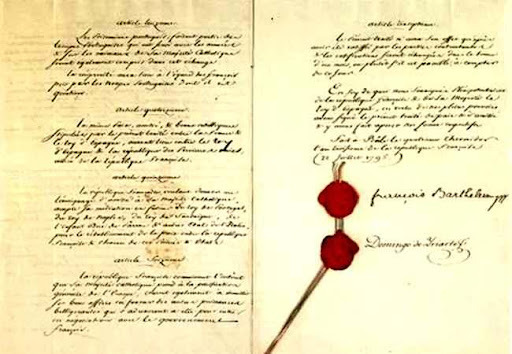#treaty of bâle
Text
The Treaty of Basle
By the opening months of 1795, France had control of Belgium, Luxembourg, and the left (west) bank of the Rhine, which had now become integral parts of the French Republic. The spring campaign brought new victories to the French arms as an invasion across the Pyrénées and victories in the Rhineland caused the First Coalition to crumble. Tuscany withdrew its unofficial support, and it was quickly followed by the new Batavian (Dutch) Republic in May. On July 22, 1795, Spain, which two years earlier had declared war on revolutionary France to stave off the threatening ideology of liberty, equality and fraternity, was forced to sue for peace after continued military setbacks. Peace offered a poor alternative for Spain given that Britain now targeted Spanish shipping, which compelled Madrid to sign a treaty of alliance with France, bringing Spain into the war against England. Thus, within a year of signing a peace with France, Spain found itself once more at war, with Britain blockading Spanish ports and attacking the Spanish arsenal at Ferrol.
Equally critical was France's sucess with Prussia, which had hinted at its withdrawal from war in 1794. During negotiations held in the Swiss city of Basle, Prussian diplomats were left in no doubt of French determination to carry on the war - "We shall trace with a sure hand the natural limits of the Republic. We shall make sure of the rivers which, after watering several of our departments, take their course toward the sea, and limit the countries now subject to our arms," declared one French delegate- but were more concerned about the events in the East, where Russia was preparing for the final partitioning of Poland. According to the terms of the Treaty of Basle, signed on April 5, 1795, Prussia withdrew from war and recognized French control of the left bank of the Rhine, while France returned all of the lands east of the Rhine captured during the war.

The Treaty of Basle marked a crucial moment in German history and was, at least according to one historian, a "death certificate" of the Holy Roman Empire, since Prussia "rejected Reich [empire] in favor of raison d'état." The treaty not only consolidated French control of the Rhineland but divided Germany into two spheres of influence, drawing a virtual line at the Main River, north of which the German States- Hesse-Cassel, Nassau, and the states of the Swabian Circle (Reichkreis)- soon followed Prussia in deserting the imperial cause and accepting neutrality agreements with France. The treaty aroused loud criticism in Germany, and anti-Prussian attitudes were felt very deeply in many southern German states, helping shape their policies in the decades ahead.
Alexander Mikaberidze - The Napoleonic Wars, A Global History.
#wars of the revolution#alexander mikaberidze#the napoleonic wars: a global history#treaty of bâle#first coalition#impact on german states
13 notes
·
View notes